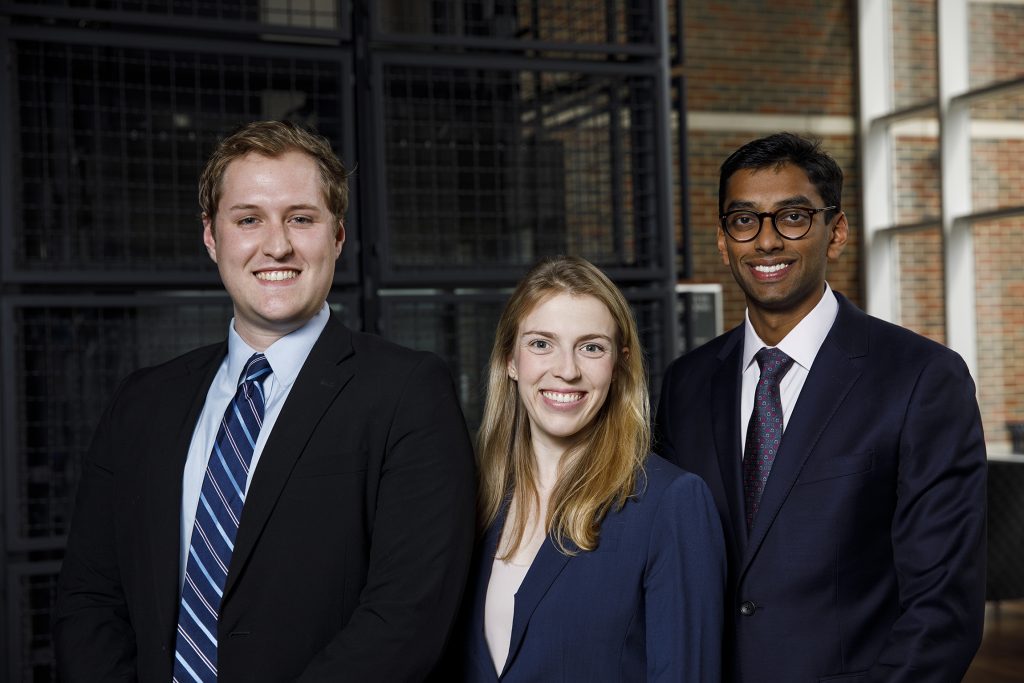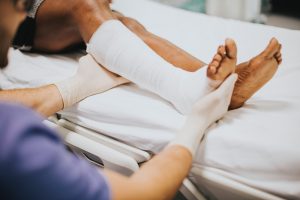
Trio of UA students bringing medical technology to market
Graduation checklist:
- Bachelor’s degree – done
- MBA – nearly finished.
- Form company – done
- File patent – done
- Receive grant for company – done
This isn’t a typical checklist, of course, but it is real for three students at The University of Alabama.
Since they were freshman at UA, the students have managed to form a company from an idea started in an entrepreneurial program. With an assist from UA, they won a federal grant to help bring their innovative solution to the market. Earlier this year, they received a provisional patent.
The trio of students formed Ortho Screws, a start-up company based on a sensor designed to alert patients and health providers if orthopedic screws are loosening. The company includes Sudarsan Murali, of New Albany, Ohio; Zoe Guckien, of Zionsville, Indiana; and Alec Hopkirk, of Nashville, Tennessee.
“There are a wealth of opportunities Alabama provides,” said Murali, a graduate student. “There is certainly a way to pursue any interest. There aren’t many places you could be a science student, do research, get an MBA and start a company on the side.”
“This has been great,” Hopkirk said. “I’ve learned a lot about entrepreneurship, and I’ve learned a lot about how to muddle through the waters to get where we are.”
All three are part of the STEM Path to MBA Program, an initiative in the Culverhouse College of Business. Students in the program earn a Bachelor of Science and a Master of Business Administration within five years, along the way getting the chance to work as a group on entrepreneurial experiences.
All of them also have a bachelor’s degree: Murali in psychology, Guckien in chemistry and Hopkirk in chemical engineering. Murali and Guckien also plan to attend medical school after this spring’s graduation. Hopkirk, who graduates in December, might work full time on the company, but, if not, he wants to work in the energy industry.
“It’s been a great learning experience, not only learning the business side of things, but being able to grow and learn hands on with this project has been incredible,” Guckien said.
The journey began as part of one of STEM Path’s innovation programs students take part in every seven weeks throughout college. The two pre-med students looked for a project involving medical technology.
Their research found up to 38 percent of metal screws in orthopedic implants, such as artificial joints, plates and other bone-supportive applications, loosen, which can cause pain and, in some cases, result in another procedure to tighten.

Through the early phase, the students discovered their idea could be its own intellectual property. They entered business pitch contests and eventually earned enough money to pay for the work on a provisional patent.
They call the technology a smart washer. It’s like a traditional washer between the screw and the base material, except it has a tag that allows non-invasive monitoring by patients and health care providers on mobile devices or computers.
“It can provide detailed information to verify if the screw is causing pain or if it is just soreness after surgery,” Murali said. “This is just a quicker, cheaper way to get that piece of mind for both the patient and the provider to get extra data points if it’s loosening.”
In spring 2018, the team won a business pitch contest on campus held by the Alabama Innovation and Mentoring of Entrepreneurs, or AIME, a part of UA’s Office of the Vice President for Research and Economic Development that focuses on growing concepts from UA researchers and creating testable prototypes to demonstrate the value the ideas bring to the marketplace.
From there, they joined Crimson Startup, a program to help new companies progress, and, after completing the program, they were selected for the National Science Foundation Innovation Corps, or I-CORPS, program. It provides entrepreneurial education, mentoring and funding to accelerate innovation to attract third-party funding. UA’s AIME is part of a network of I-Corps sites across the nation.
“I-Corps has given us a lot more credibility,” Guckien said.
With the $50,000 grant, the students were able to conduct customer research to help focus the product’s market, she said.
Murali said they were the only student-led team at last year’s national conference.
“Typically these teams have a principal investigator who is a university researcher, and it’s their idea that’s taken through the program,” Guckien said. “We’re sort of atypical because it’s a student idea.”
The students credit Dr. Rob Morgan, director of the STEM PATH program, Phifer Fellow and professor of marketing, along with Dr. Dan Daly, AIME director, and their industry mentor, Dr. Larry Greer, a retired dentist and venture fund manager, with helping them navigate the process from start-up to patent and seed money.
“Having the I-Corps site program here and the STEM Path to MBA curriculum, we were already familiar with a lot of what this program is centered on, so it was easier to go through this process,” Guckien said. “It’s been nice to have people to talk to who have done some of this.”
